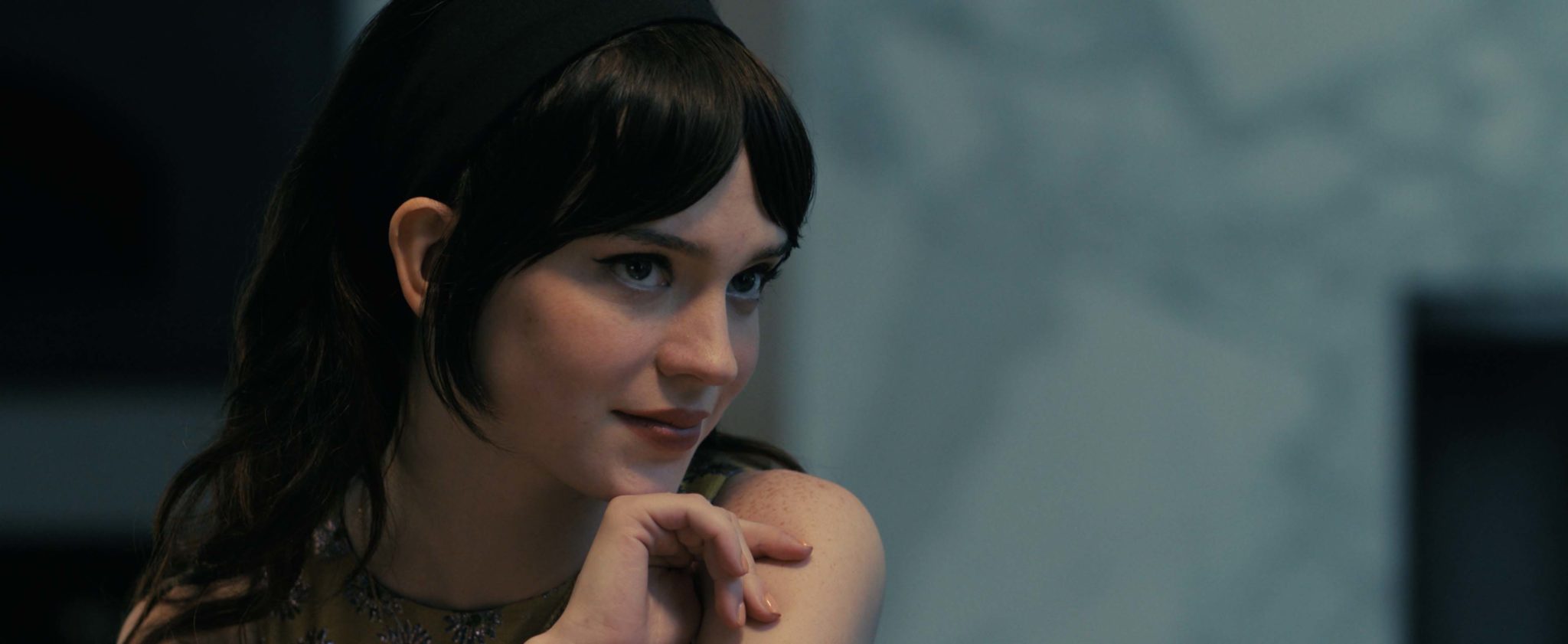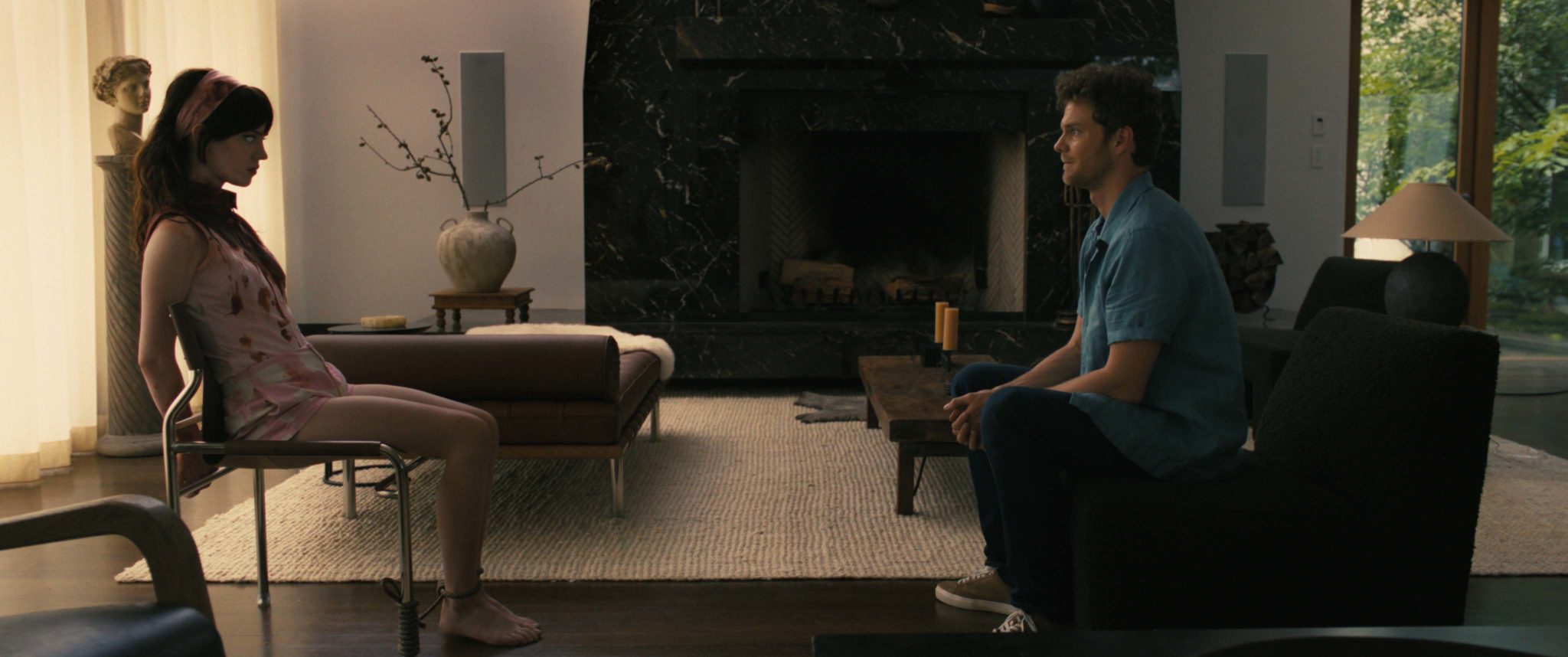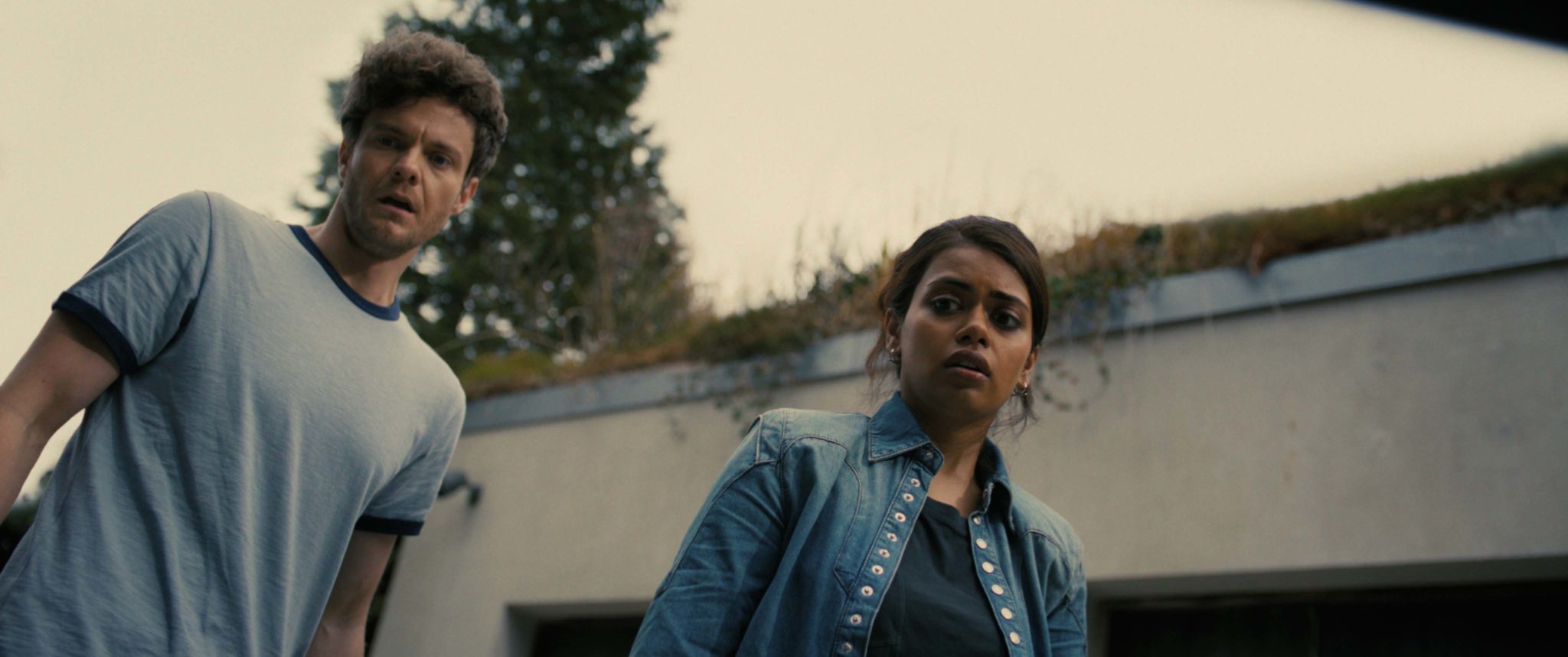- Film And TV
- 03 Feb 25

Star Sophie Thatcher speaks to Roe McDermott about the dangers of AI, incels, the manosphere, and her love of dark feminist projects.
Does AI stand for ‘artificial intelligence’ or ‘artificial intimacy’? With the rise in apps and chatbots designed to give personal advice, imitate a romantic partner or even engage in some sexual roleplay, the lines are becoming increasingly blurred.
Apps like Eva and Replika allow users to create their own personalised AI companions. Eva – unsurprisingly marketed mainly to heterosexual men – offers the option to choose specific traits for a partner, such as “attractive, funny, bold” or “intelligent, cute, shy.” In contrast, Replika uses realistic, photo-like images of women to construct the profiles of its digital companions, even incorporating voice messages for a more interactive experience. Users can interact with these AI partners as if they were in a relationship, with a companion that is always available, agrees with them, and meets their unique preferences.
Some users claim to find these virtual relationships beneficial, particularly those who struggle with loneliness or low confidence. There are also more devoted users, who frequent Replika subreddits to share how much they love their “Rep”, discussing deep emotional connections with their digital companions.
However, psychologists and researchers are far from convinced these apps are beneficial, highlighting how they can encourage users to withdraw from genuine social interaction. In addition, they can prevent users from learning how to appreciate, love and deal with real people with their own agency, as opposed to being designed to – literally – cater to users’ every whim.
Along with the increasing popularity of the misogynistic “manosphere”, many researchers highlight that the predominantly heterosexual male users of these apps may develop deeply harmful ideas, as they compare real women to the female-coded AI, which they can literally control at the touch of a button.
Advertisement
The harmful impact of female-coded bots and digital assistants on women has been well-documented for years, largely due to the widespread use of the female-coded assistant apps, Siri and Alexa. A 2019 report from Unesco highlighted that assigning female genders to digital assistants, like Amazon’s Alexa and Apple’s Siri, reinforces harmful gender stereotypes. The voices and names of these assistants, paired with their default female personas, link women with home-based roles.
Furthermore, their constant availability and accommodating, eager-to-please behaviour can shape users’ perceptions, tying femininity to notions of agreeableness and service. This can affect how women are viewed in the real world, with the Unesco report noting that “the more culture links women to assistants, the more real women will be seen as assistants — and penalised for not being assistant-like.”
The comparisons between women and female-coded technology is already harming women, and is becoming more dystopian thanks to the emergence of interactive sexbots. Vendors such as Joy Love Dolls offer completely customisable dolls, which not only allow users to choose their preferred skin colour, body shape and breast size, but also offer “complete control” of features, including movement and AI- enabled “moans, squeals, and even flirting from your doll, making her a great companion.”
If we bear in mind that there’s already on orgasm gap in sexual interactions between men and women, where women orgasm less than 40% of the time (a gap not found in sex between women or experienced by women masturbating), and acknowledge that we already have a huge problem around acknowledging, accommodating and prioritising women’s pleasure, it’s safe to assume that men who programme sex dolls to perform orgasms on demand, are not going to learn a lot about actually giving pleasure to a real partner.
Nor are the going to learn how to appreciate or enjoy the effort, connection and patience that goes into actually learning about a real partner’s sexual needs, desires or preferences.
When it comes to programming female-coded A.I., sexbots and apps, you have to wonder: did these tech founders and inventors watch the misogynistic, controlling men in Don’t Worry Darling, who used technology to control women, and think they were stand-up romantic partners to be emulated?
As these questions around AI, intimacy and gender relations become all the more pressing and prescient, a new sci-fi psychological thriller, Companion, provides a terrifying, thought-provoking and darkly funny glimpse into what our future could look like if we don’t tackle these issues head-on. (And in order to write about these issues head-on, this piece will contain spoilers for the film.)
Advertisement
 Companion.
Companion.Directed by Drew Hancock and starring Jack Quaid (The Boys) and Sophie Thatcher (Yellowjackets, Heretic), Companion follows the apparently picture-perfect relationship between Josh and Iris, who visit a friend’s bougie lake cabin for a weekend. Told from the perspective of Iris, she recounts the meet-cute that led to her meeting her charming and committed boyfriend, and through their interactions, we learn that the beautiful Iris – who always dresses in ultra-feminine, slightly ‘60s fashion a lá Zoey Deschanel in 500 Days Of Summer – is somewhat insecure, but utterly besotted and ever-doting.
But when their weekend takes a dark turn, Iris realises the dark truth about her relationship with Josh and indeed her very being: she is a robot, pre-programmed with constructed memories about her life and relationship with Josh, and completely controlled by him.
Her intelligence level, confidence, agreeableness and sex drive is controlled via an app by Josh, a misogynist who feels entitled to a female companion completely under his control. As Josh’s dark motivations and plans for Iris are revealed, Companion becomes a smart, pacy, thriller, filled with action and insight, with fantastic performances and dark wit.
The great lead performance from Sophie Thatcher will come as no surprise to anyone who has seen her in Showtime’s Yellowjackets, often described as a female Lord Of The Flies, or last year’s wildly enjoyable horror film Heretic, where her character has to try escape the slimy Machiavellian clutches of Hugh Grant. Thatcher’s roles often have an undercurrent of feminist rage, and the actress says that Companion’s exploration of AI and technology, as well as a rising culture of misogyny – especially in the States where Trump has been voted back into the White House – was immediately interesting to her.
“It’s interesting, because we stopped for the movie for the writer strike,” says the 24-year-old, ruffling her trademark wolf-cut hair. “The AI stuff was the kind of thing I’ve been avoiding because it didn’t feel real. But then, as soon as the writers’ strike happened, all of our jobs were put on hold because of the conversation around AI, and to me, that was the biggest slap of reality. So returning to work on this movie, I thought, ‘Okay, we’re really saying something, and it’s showing just how disconnected we are, and how it is such a real thing.’
Advertisement
“I thought it was so great how it was then blended into the horror genre, because we can relate to it, but with this extra thread of gender. The Josh character is interesting, because you don’t know who he is until later on. You see that loneliness, he’s an incel, and it is a very relevant thing in our culture. These men can just be trolls, and really put other women against other women, and bring women down. But I think that Iris’ arc in the movie is really about finding and loving herself, even in such a fucked-up world around her.
“It’s especially relevant for women with Trump coming in, that was really defeating. But it’s good to find some fight. Like, I remember leaving set feeling more confident about myself. And I love to do movies like that, because there was such a such an arc in our character, even though everything in the world is against her, which is kind of what a lot of a lot of women are feeling right now.”
 Companion.
Companion.Indeed, the arc of Companion seems to be part of a growing trend of movies that seem like they are romances, before revealing a darker reality, where the men who are supposed to be loving and protective of women are revealed to be dangerous, such as Don’t Worry Darling, Passengers and It Ends With Us. The conscious-gaining moments in these movies, where the female characters realise the men around them are dangerous, echoes not only the nature of intimate abuse and control – where female abuse victims often start out experiencing a loving relationship – but also an experience of consciousness that women are going through.
This has involved seeing the men in their lives vote for Trump, or venerate men like Andrew Tate and Jordan Peterson; seeing the rise of Trad Wives; and realising that misogyny is everywhere. Thatcher found that flip in the story of Companion really powerful to play, as Iris realises that the man she thought she loved is controlling her.
“It’s powerful in a way that I’ve been there in relationships,” reveals Thatcher. “I think sometimes you can get really swept up into a relationship and lose who you are, because you’re so co-dependent and giving everything. You can be so completely blindsided by it and not realise when you’re in it. Then you can look at it years from the actual moment and realise it.
Advertisement
“In Iris’ case, she doesn’t really have a choice. But I think it’s remarkable she’s able to acknowledge that later on, because of course it’s hard to let go of the idea that you’re loved or safe. But that is a very real thing that happens to many women, realising that about their relationship. I watched Priscilla last night, the, Sofia Coppola movie, and I kept seeing so many parallels. That shift in the movie as Iris realises, it just feels like a slap in the face, and that’s how it felt shooting. It was definitely the hardest scene I’ve ever done, because there were so many levels to it.”
 Companion.
Companion.Companion is layered with brilliant clues and details that make rewatching a joy, as you can see the small tells about Iris’ true nature – but it also reveals the mechanics of misogyny. Josh’s friend Kat, played by Megan Suri, openly dislikes Iris and there’s a tension between the women that is subtly enabled by Josh.
We later realise that not only is Kat justifiably insecure, not only about what it means for her as a human woman to see men in her social circle dating programmable robots, but also because women are so often pitted against each other, and taught to see each other as competition rather than allies.
“That tension is so interesting,” says Thatcher. “I think Kat feels it immensely, and it turns into this thing where women are just put against each other, and constantly comparing themselves to each other, which is really hard to shake off. People have built women to be absolutely insecure. I was thinking of The Substance, actually. There’s this idea of women having to fear these constantly shifting goal posts, and this idea of that you are replaceable with another, different kind of woman – someone prettier, younger, more appealing to men.”
Companion’s wit, great action, and thought-provoking ideas are sure to make it a hit, and Thatcher is also returning to our small screens in February for her similarly dark and witty TV show, Yellowjackets, which is on season three. This is the first season where Juliette Lewis will not be returning as the older version of Thatcher’s character, and the young actress says she will miss her mentor and idol immensely.
Advertisement
“It makes me really emotional, I miss her!” she exclaims. “But I’m more confident this season in myself, because I’d done the other projects. I feel in a groove right now and very warmed-up as an actor. It’s different than the confidence I had in the first season, because you didn’t know if anyone was going to watch it. So there was this looseness that felt more like an indie movie.
“Then going to season two, everyone felt a lot of pressure after the Emmys. For season three, all I was hoping was that the character would have a good arc and that I’d be able to release a lot of emotions. And I do, way more so than the other seasons, so I’m excited for people to see it.”
• Companion is in cinemas from January 31.










